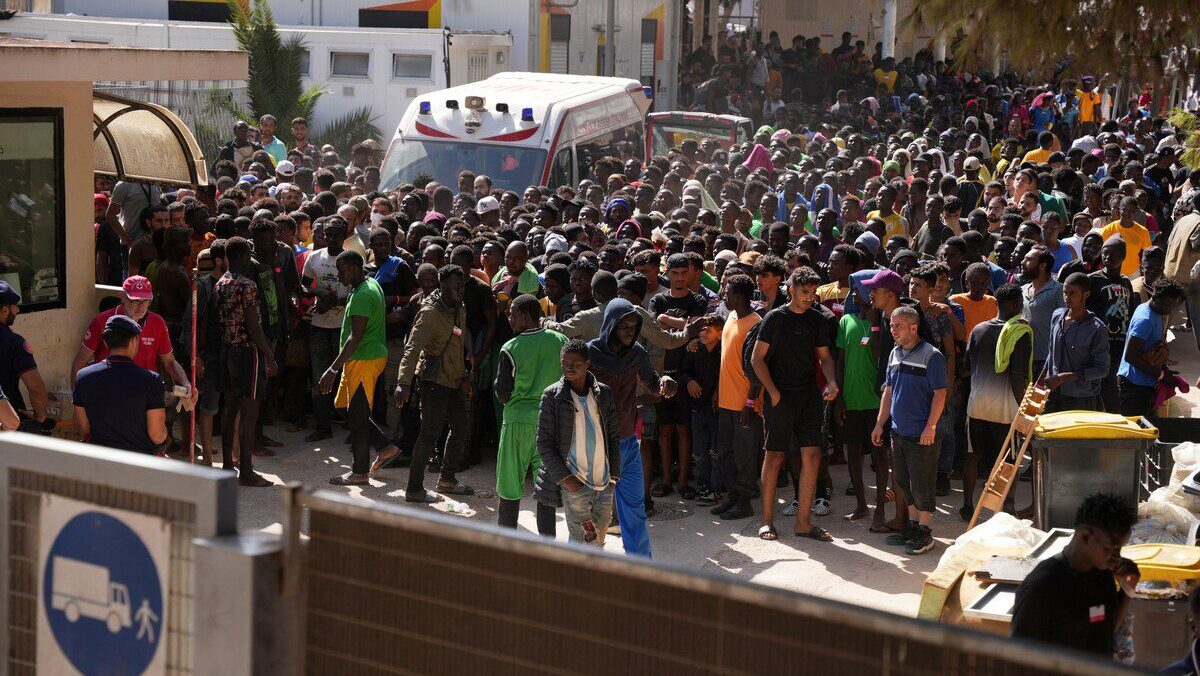
Newly arrived migrants in the Lampedusa reception center in September 2023.
Photo: Zakaria ABDELKAFI / AFP
More than five out of six migrants with deportation orders—like the Brussels terrorist—are still in Europe illegally.
Only 65,000 out of 400,000 deportation orders have been carried out this year, the EU’s Home Affairs Commissioner Ylva Johansson admitted at a press conference Wednesday evening, October 19th. The Commission’s proposed “Returns Directive” would speed up the process, but the European Parliament is still blocking it.
According to these figures, the EU’s effective deportation rate in 2023 is 16.25%, which means a majority of economic migrants with rejected asylum claims do not leave the bloc.These numbers also reveal that the EU’s track record is gradually worsening over time, despite the European Commission vowing to ramp up deportations earlier this year. The same figure stood at 21% last year, and Johansson already warned that this failure “hampers our system and erodes trust.”
In wake of the Islamist terror attack earlier this week in Brussels—carried out by an illegal migrant who was allowed to stay in the EU for three years after his asylum request was rejected thrice—the Commission began to revive the efforts to amend this failure, pushing the both EU countries and the European Parliament to take the necessary steps.
According to Commission Vice President Margaritis Schinas, the obvious solution to this crisis would be the so-called ‘Returns Directive’—a proposed measure aiming to make it mandatory for EU member states to carry out deportations.
The new version would update the initial directive passed back in 2008, which already allows unilateral deportations, but requires member states to offer a period of voluntary return notice before forcibly removing illegal migrants. The new version would scrap this requirement, and make the process more effective altogether.
The only problem is that the European Parliament has been sitting on it for four years, practically blocking the legislation from moving forward.
❗ Over 50% of EU #organisedcrime suspects aren't EU nationals.
— EPP Group (@EPPGroup) October 18, 2023
"We propose a Returns Directive and mandatory forced returns for people with convictions and who are a threat to public order and security," says @MargSchinas @EU_Commission Vice-President. #EPlenary pic.twitter.com/PZiNYc2kfQ
“We now have common positions from both Council and Parliament on all aspects of the [Asylum and Migration] package,” Schinas said at Wednesday’s press conference. “Except the Returns Directive, where the Parliament has not yet provided a position.”
During all these years, the Parliament’s leftist majority—under the file’s Green rapporteur—worked to make the legislation more humane and “respectful of fundamental rights.” For instance, MEPs called for offering reintegration programs for deportees in their home countries, reducing possibilities for member states to impose re-entry bans, and not only keeping the voluntary return notice requirement but even extending the period to 30 days.
In the end, the main leftist parties (S&D, Renew, Greens) were unable to find common ground with the center-right EPP, the only other party needed for a majority, on the maximum allowed detention period of deportees, which led to the file being put “on hold” in early 2020.
However, informal negotiations on the Returns Directive will resume next week due to the Commission’s renewed push for a compromise, as officials hope to finalize the legislation sometime before next June’s European Elections.
